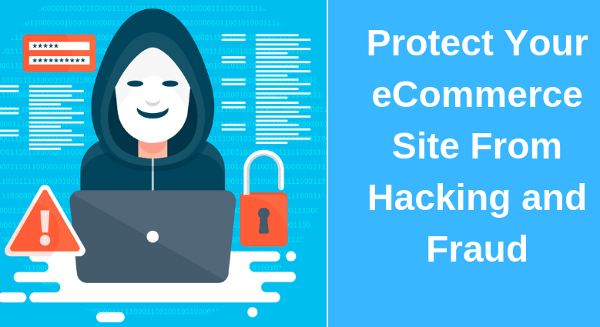
According to the Hacked Website Report by Sucuri, the number of websites getting compromised by hackers is increasing every year. The damage related to cybercrime is expected to hit $6 trillion by the end of 2020.
If you plan to launch an eCommerce website or already running a successful one, you must regularly upgrade your website's security. Here, I share some useful ways to keep your eCommerce site safe from hackers and fraudsters.
1. Start Using SSL/TLS Right Now
These days, using and monitoring a Secure Socket Layer (SSL) or Transport Layer Security (TLS) is essential. It encrypts the communication between the browser and the website server and thus levels up the security many times.
E-commerce sites often ask for sensitive information such as debit/credit card details, Internet Banking passwords, etc. With SSL/TLS, every piece of information is encrypted before sending it to the website, thus preventing eavesdroppers from accessing it. Overall, it helps to maintain the confidentiality of users' information.
Some people refer to TLS as SSL. Though there is a technical difference between these two terms, it's not something you should worry about. You should focus on using the latest version and avoid vulnerable versions of the SSL or TLS encryption library.
2. Define Network Access Layers
Consider defining network access layers for better security if you're running an eCommerce business. If you are unaware, let me explain it to you in simple words.
E-commerce sites are not only accessible to customers, employees, and business partners, but they are also publicly open to hackers. Anyone from anywhere can log in to their account and access data, thus creating a risk of data breaches.
There should be a physical separation between the network that business partners can access and one that contains sensitive customer data. Corporate data should have layered security, with each layer having more robust identification, credential, and access management restrictions. This will help you keep hackers away from your eCommerce business.
3. Use Firewall
The Internet is filled with different kinds of Viruses and Trojans. A lot of websites already got compromised due to them because they failed to implement proper security measures at the right time.
A firewall is a layer between your system and the coming traffic. It's capable of avoiding Trojans and virus attacks and sends you an alert when any suspicious event occurs on your server.
Every eCommerce website should have an extra layer of the security login page, contact forms, and search queries. It monitors traffic coming to your server, allows you to set a predefined access control list, and avoids SQL injection and cross-site scripting attacks.
4. Choose Your Hosting Provider Wisely
Hosting plays a critical role in your website's success. That's why you should never choose a hosting provider just by getting attracted to their lucrative offer. Instead, go with the one that offers essential tools and applications to easily and securely develop and manage an eCommerce website. You can look for the following characteristics while choosing a good hosting provider:
- Performs regular backups.
- Performs regular network monitoring.
- Maintains detailed logs.
- Clear with the policies and procedures they have in case of an attack.
- Employs high-grade encryption (at least 128 bit AES).
- Provides seamless support in emergencies.
5. Don't Collect or Store Sensitive Information from Customers
E-commerce websites should only collect and store minimum information for current use and no more than that. Use an encrypted checkout tunnel to ensure your servers can never see the customer's card details for processing credit cards.
It might sound a little inconvenient to users, but a lot of websites are already using it, and believe me, its benefits far outweigh the risk of compromising credit card numbers.
According to the PCI security standard council, there are also certain penalties for eCommerce players who violate security guidelines. Just remember, Hackers cannot steal what you don't have. Therefore, avoid collecting sensitive information or private data for your own good.
6. Remove Software or Third-Party Plugins that Risks Your Website's Security
A website is developed using many components which are not secure. If you're building a new site or redesigning it, look for safer choices.
For example, HTML 5 will help you eliminate the potential risks of Java. Also, try to avoid Adobe Flash and other risky applications wherever possible. If you cannot avoid those applications, make sure you update them regularly to have the most secure version.
7. Correctly Configure Essential Protections
Just buying a firewall to protect your website won't help. You must correctly configure its essential protections to make the most out of it. If you are in complete control of your eCommerce website and can access the network security infrastructure, it's terrific. Otherwise, ask your developer or hosting provider or whoever maintains your website to implement the following security services.
- Data loss detection
- Data loss prevention
- Intrusion detection and tracking services
- DDoS protection
- Advanced threat detection
- Fraud management service
- Reputation defenses
- Antimalware feature
8. Set Up a System Alert
You just can't let your customers use your website or place an order in any way they want. Every merchant must have an 'alert system' that will notify whenever it finds a person suspicious during their online transactions.
Your system must be able to identify if a person places multiple orders with different addresses, credit cards, mobile numbers, etc. To avoid suspicious transactions, you can also check that the order recipient's name matches with card details. You can also assign a team to check If a multiple order request is coming from the same IP and inform the server administrators.
9. Test Your eCommerce Website Regularly
If you want to protect your eCommerce site from hackers, you must regularly test your website to ensure everything works perfectly. This includes:
- Standard Scanning: Check all the pages and links of your site carefully to ensure hackers have not introduced any malware into graphics advertisement of content provided by third parties.
- Professional Scanning: When it comes to protecting a website from harmful elements of the Internet, consider hiring experienced cybersecurity consultants or ethical hackers for in-depth analysis and identifying vulnerabilities in the code.
- Security apps: Sometimes, leftover source code or debug code itself becomes a pathway for hackers and puts confidential data at risk. It would be best to look into web application scanning tools to identify various vulnerabilities such as Cross-site Scripting (XSS) or finding potential dangers in the leftover code.
10. Ask Your Customers to Set Strong Password
As you know that you can't clap with one hand, and that's even true in this case. You cannot ensure the security of your website if your customers are not following basic security guidelines. Hackers don't need any specific route to enter your site; they keep looking for security loopholes to perform attacks.
Ask your customer to set a long and strong password containing capital letters, small letters, numbers, and special characters. You can also remind your customers to change their passwords at a regular time interval.
Conclusion
These were some of the useful ways to keep your eCommerce website protected from hackers. The fact is that your customers depend on you to secure their data. They believe in you that you'll take care of their privacy seriously. That's why you should always keep a strong check on your website's security and provide a hassle-free experience to your customers.


 Copyright 2000-2025, WebSitePulse. All rights reserved.
Copyright 2000-2025, WebSitePulse. All rights reserved.